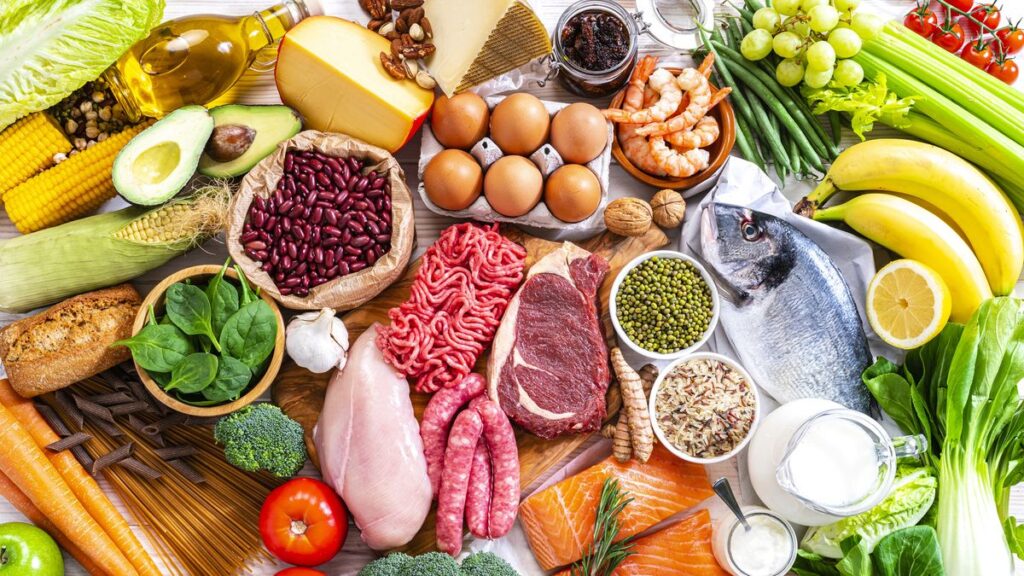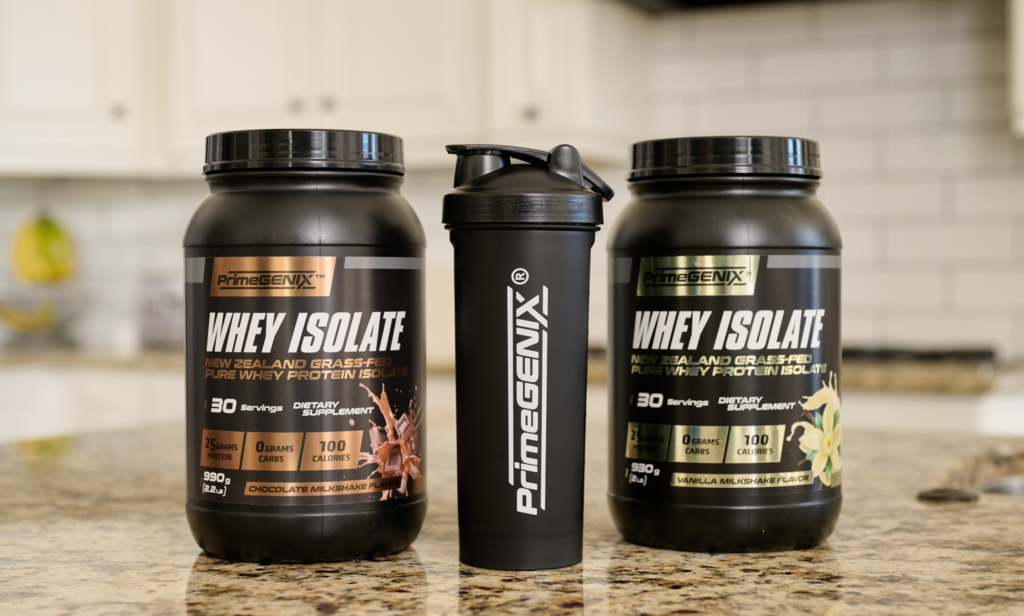Protein is considered the building block of life, and for good reason. This macronutrient significantly impacts our diet and fitness journey as a cornerstone for weight loss, muscle gain, and overall health.
Understanding the influence of protein is essential, whether you’re a fitness enthusiast, an athlete, or simply looking to improve your physical well-being. Today, we’re diving into the world of protein, examining its various types and how each contributes differently to hormone production, muscle repair, and overall health.
We differentiate between the range of protein sources and assess their effectiveness for weight loss and muscle gain. We cover the diverse sources of natural protein and look closer at whey protein, a versatile option that can benefit both muscle gain and weight loss.
Why Protein Matters in Health and Fitness
Protein is an essential macronutrient that serves various functions within our bodies. Firstly, it serves as the building blocks for muscle tissue. When we engage in strength training, resistance exercises, and other forms of physical activity, we create tiny tears in our muscle fibers. Protein helps repair and rebuild these muscle tissues, increasing their strength and resilience, which is imperative for muscle growth and repair.
This macronutrient is also crucial for hormone production. Vital hormones like insulin and growth hormones regulate metabolism and facilitate muscle growth. Beyond muscle repair, protein provides our bodies with the amino acids necessary for synthesizing these hormones. This process ensures our bodies function optimally.
Protein is about more than just muscles; it’s crucial for overall health. It helps maintain healthy skin, hair, and nails, supports the production of enzymes and neurotransmitters, and aids in immune function. Essentially, protein is the hidden champion of our physical well-being.
Different Types of Protein and Their Impact on Health and Fitness
Protein comes in various forms. Each has its characteristics and benefits for exercise enthusiasts and those pursuing weight reduction. In this section, we’ll explore some of the main types of protein and how they can impact your physical goals.

Plant-Based Proteins
Plant-based proteins are increasingly popular among those seeking a sustainable and healthy diet, offering numerous advantages for fitness enthusiasts. These proteins are often lower in calories and saturated fats while also packed with fiber. This combination contributes to feeling satisfied after mealtime and aids in digestive health.
Common sources of plant-based proteins include the following:
- Beans
- Lentils
- Quinoa
- Chickpeas
- Tofu
This protein source is excellent for those following a vegetarian or vegan diet. It’s essential to recognize that plant-based proteins may lack some essential amino acids, necessary for building muscle tissue. Consume a diverse selection of plant-based protein sources to ensure complete protein intake.
Animal-Based Proteins
Animal-based proteins are recognized for their complete amino acid profiles and high-quality protein content. They are particularly beneficial for muscle growth and repair, providing all the essential amino acids our bodies need.
Animal-based proteins can be found in the following lean cuts:
- Chicken
- Turkey
- Fish
- Beef
- Pork
Choosing lean cuts is vital to minimize saturated fat intake and keep overall calorie consumption in check. These nutrient-dense proteins offer essential vitamins and minerals, making them the go-to option for those looking to build lean muscle mass while supporting overall health.
Dairy and Casein Proteins
Casein is a slow-digesting protein, making it ideal for muscle recovery during sleep. Dairy products provide a steady release of amino acids while you rest, supporting muscle repair and growth.
The following are rich sources of casein proteins:
- Greek Yogurt
- Cottage Cheese
- Milk
- Cheese (particularly hard cheeses)
- Casein Protein Supplements
These versatile proteins can be integrated into various meals and snacks for sustained protein intake. Snacking on Greek yogurt with berries and nuts can be a satisfying post-workout snack thanks to its combination of carbohydrates and casein protein.
Soy Protein
Soy protein is a plant-based option that offers a complete source of protein. Soy protein contains all the essential amino acids, making it beneficial for vegans and vegetarians.
The following are sources of soy protein:
- Tempeh
- Tofu
- Edamame
- Soy Milk
- Soy-Based Meat Substitutes
Soy protein aids muscle gain and recovery and is easily incorporated into your diet. Additionally, it contains phytoestrogens, which support heart health due to its cholesterol-lowering properties.
Collagen Protein
Collagen protein may not be the top choice for muscle gain, but this protein is essential in overall health and fitness. While collagen is most often associated with skin health, it also benefits joint mobility, skin elasticity, and gut health.
Collagen is primarily sourced from the following animal byproducts:
- Bone Broth
- Chicken, Fish, and Pork Skin
- Gelatin
- Collagen Supplements
Collagen protein may be a valuable addition to a fitness-focused diet for exercise enthusiasts engaged in high-impact activities.
Whey Protein
Whey protein is a highly revered protein source in the fitness community. These proteins are packed with all essential amino acids and are known for their rapid absorption and muscle-building properties.
Whey protein is a natural protein found in milk. The following are some natural sources of whey protein:
- Cow Milk
- Cheese
- Greek Yogurt
- Whey Protein Supplements
It’s an ideal choice for guys aiming to maximize muscle growth and recovery and is commonly used in post-workout shakes to kickstart muscle repair.

The Protein Puzzle: Which Sources Are Best for Your Goals?
When choosing the right protein source for your fitness goals, it’s essential to remember that there’s no one-size-fits-all approach. While different types of protein support various objectives, your selection should align with your needs – building lean muscle or shedding unwanted pounds.
Here, we’ll examine which proteins best suit your overall goals.
Proteins for Weight Loss
Protein can be pivotal in your weight management journey, helping you drop excess weight more effectively. Selecting the right protein source is crucial when your primary goal is to slim down.
Plant-Based Proteins
Incorporating legumes, tofu, tempeh, and other plant-based proteins can be advantageous when striving to lose weight. They tend to be lower in calories and saturated fat compared to animal-based counterparts, which supports your calorie deficit. The high fiber content of plant-based proteins also promotes feelings of fullness, reducing calorie intake by controlling appetite.
Animal-Based Proteins
Lean cuts of animal-based proteins are excellent choices for supporting weight loss goals. For example, the high-quality protein in skinless poultry and fish lets you skip the excessive fat content found in fattier cuts.
Dairy and Casein Proteins
Dairy and casein proteins, like low-fat Greek yogurt, contribute to feeling comfortably full after eating. This feeling of contentment lets your body know it’s had enough to eat, reducing the need to keep snacking or overeating. These proteins support muscle preservation during calorie restriction, which is essential for maintaining a healthy metabolic rate.
Whey Proteins
Consider supplementing your diet with whey protein. It’s a convenient and effective supplement to control appetite and preserve lean muscle mass, mainly when consumed as a post-workout shake. Whey protein is an invaluable asset, bolstering your weight loss efforts.
Proteins for Muscle Gain
Fitness goals revolving around building lean muscle mass require protein sources aligning with this objective. Muscle gain requires ample high-quality protein sources, which provide essential amino acids and support muscle growth and recovery.
Animal-Based Proteins
Animal-based proteins take the top spot as contenders for muscle gain. Prioritize animal-based proteins for their high-quality amino acid profiles and supply of essential vitamins and minerals, which are crucial for athletic performance and overall health.
Lean cuts of beef, chicken, turkey, and fish options are rich in complete proteins. This means they deliver all the essential amino acids the body needs to build and repair muscle tissue.
Dairy and Casein Proteins
Dairy and casein proteins can serve as slow-digesting sources of protein. Combine dairy and casein proteins for a steady stream of amino acids throughout the day. Consuming products like cottage cheese and Greek yogurt before bed ensures a continuous supply of amino acids to your muscles during sleep, aiding in overnight muscle recovery.
Whey Proteins
Incorporating whey protein can accelerate muscle repair and growth due to its rapid absorption rate. Consuming it post-workout, particularly after resistance training, provides the most benefit, jumpstarting muscle recovery and growth. Supplementing with whey protein adds a powerful weapon to your muscle-building arsenal.

Maximize the Benefits of Your Protein Choices
As we conclude our foray into the world of protein and its profound impact on fitness and nutrition, it’s clear this macronutrient is about more than just building muscle and dropping unwanted pounds. It’s the foundation for a healthy, strong, and vibrant life.
The power of protein cannot be underestimated, and finding the most suitable protein sources can propel you toward your fitness goals. Plant-based proteins are excellent for those looking to shed excess weight, while animal-based proteins reign supreme for muscle gain.
Whey protein stands out as a versatile choice for both goals. Its rapid absorption and muscle-building properties are an advantage to your fitness routine. To explore this powerful protein further, consider checking out PrimeGENIX Whey Protein Isolate. It’s a convenient and effective way to boost your protein intake.
Embrace the diversity of protein and let it be your partner on the path to a healthier, stronger you. Your body will thank you for it.
